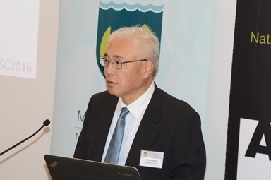Ambassador Kusaka attends Indo-Pacific Maritime Security Conference
2016/3/23
On Wednesday 16 March 2016, Ambassador Kusaka attended the Indo-Pacific Maritime Security Conference hosted by the National Security College at the Australian National University. The conference focused on several issues, including maritime tensions in the East and South China seas, transnational security issues, the Indian Ocean, and the role of Japan as a regional security partner. Speakers at this event included eminent experts and policy practitioners from key Indo-Pacific countries.
In his remarks, Ambassador Kusaka touched upon Japan’s proactive contribution to peace and the Japanese Government’s new legislation for peace and security, large scale land reclamation and militarisation activities in the South China Sea, the rule of law, and the freedom of navigation. He then expressed the importance of cooperation between countries as no nation alone can maintain its own peace and security. It is important for the international community to cooperate to preserve an open, free, and peaceful maritime environment. As president of the G7 this year, Japan will expend every effort in both maintaining and developing open and stable seas. His remarks then continued to emphasise the importance of Japan’s strategic and economic partnership with India.
In regards to Japan and Australia’s special relationship, Ambassador Kusaka described the partnership as ‘crucial’ for the region, which was also reflected in the sentiments expressed during Prime Minister Turnbull’s recent visit to Japan. The Ambassador proceeded to describe the two countries as ‘bookends’ of the Western Pacific, and that our traditionally economic-based partnership is now evolving into a strategic one as well. He also touched upon the agreement reached by both Foreign Minister Kishida and Foreign Minister Bishop to implement a ‘Pacific Strategy’ to develop further cooperation between our two countries. In regards to which submarine should be selected for Australia’s Future Submarine project, the Ambassador stated Japan will respect that this matter is a sovereign decision of the Australian government. That being said, Japan is very confident in the world class capabilities of the Soryu submarine, and have delivered submarines on schedule and on budget over the many decades.

In his remarks, Ambassador Kusaka touched upon Japan’s proactive contribution to peace and the Japanese Government’s new legislation for peace and security, large scale land reclamation and militarisation activities in the South China Sea, the rule of law, and the freedom of navigation. He then expressed the importance of cooperation between countries as no nation alone can maintain its own peace and security. It is important for the international community to cooperate to preserve an open, free, and peaceful maritime environment. As president of the G7 this year, Japan will expend every effort in both maintaining and developing open and stable seas. His remarks then continued to emphasise the importance of Japan’s strategic and economic partnership with India.
In regards to Japan and Australia’s special relationship, Ambassador Kusaka described the partnership as ‘crucial’ for the region, which was also reflected in the sentiments expressed during Prime Minister Turnbull’s recent visit to Japan. The Ambassador proceeded to describe the two countries as ‘bookends’ of the Western Pacific, and that our traditionally economic-based partnership is now evolving into a strategic one as well. He also touched upon the agreement reached by both Foreign Minister Kishida and Foreign Minister Bishop to implement a ‘Pacific Strategy’ to develop further cooperation between our two countries. In regards to which submarine should be selected for Australia’s Future Submarine project, the Ambassador stated Japan will respect that this matter is a sovereign decision of the Australian government. That being said, Japan is very confident in the world class capabilities of the Soryu submarine, and have delivered submarines on schedule and on budget over the many decades.

